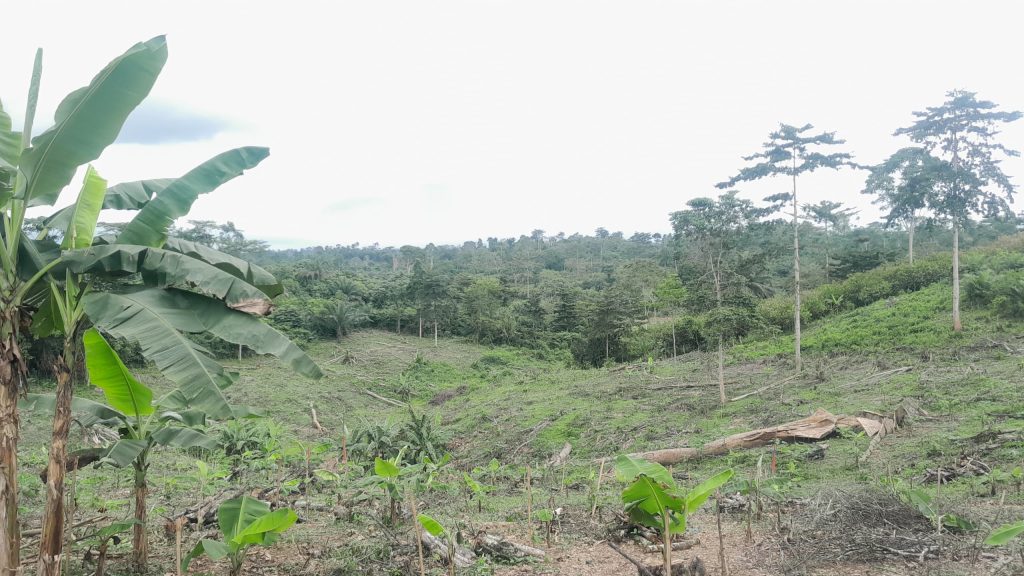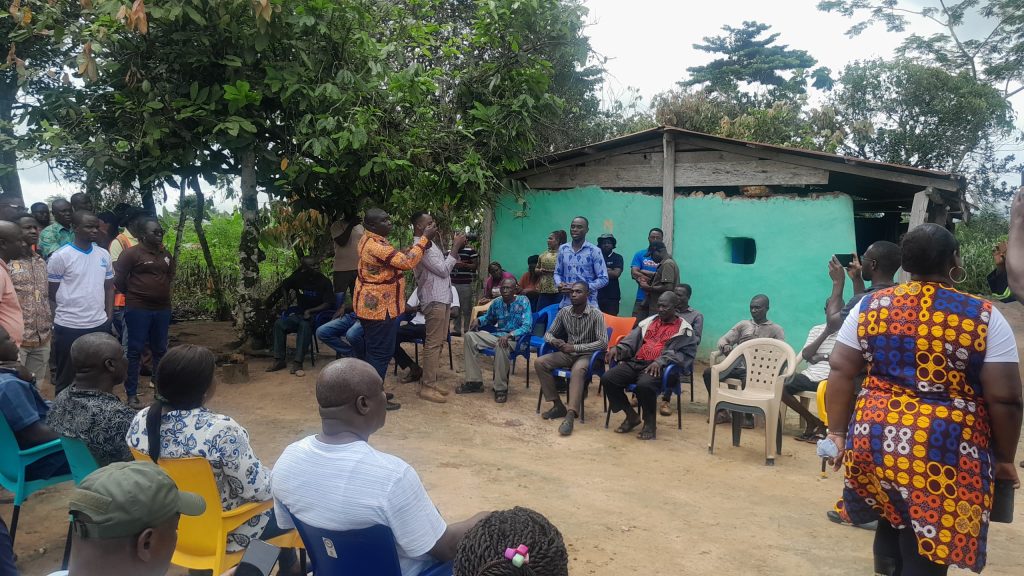By Prince Acquah
Twifo Praso (C/R), Oct. 07, GNA – Oscar Kodwovi Goka was initially sceptical when agricultural officers approached him many months back to rejuvenate his 80-year-old low-yielding cocoa farm at Aboso in the Twifo-Atti Morkwa District.
The middle-aged cocoa farmer was not willing to cut down the overaged cocoa trees bequeathed to him by his parents, even though they were not yielding adequate fruits and taking a toll on him economically.
Grudgingly, he eventually agreed to the proposal after persuasions by the officers and cut the old trees which were replaced with free cocoa seedlings to revive the 1.55-hectare farm.
On July 12 this year, Mr Goka replanted the cocoa seedlings and other crops such as plantain, beans, cocoyam and assorted vegetables which he also received for free.
With delight and pride, he now looks over his beautiful green rejuvenated farmland just beneath his house on the hill, fully optimistic of better yields and plenty of cash in a few years.
Mr Goka and other beneficiary farmers, narrated their stories with gratitude when Madam Ophelia Mensah Hayford, the Minister for Environment, Science, Technology and Innovation (MESTI), paid a working visit to the district.
The Minister toured some cocoa and oil palm farms in Aboso and Akweikrom, both farming communities in the Twifo-Atti-Morkwa District, to assess the progress and impact of the Ghana Landscape Restoration and Small-Scale Mining project introduced in 2022.
The multi-sectoral project is a collaboration between MESTI, the Ministry of Lands and Natural Resources, the Ghana Cocoa Board and the World Bank, which seeks to reclaim and restore degraded lands.

The landscape restoration leg, being handled by MESTI seeks to restore degraded lands within forest reserves and wildlife protected areas as well as agricultural lands.
The government is assisting farmers to do replanting on moribund farms with training and inputs such as suckers, cocoa seedlings, oil palm, rice, coconut, cowpea, maize, assorted vegetable seeds, fertilizers, and insecticides as well as some funding.
The Minister explained that the project would help to sustain the environment and mitigate the debilitating impact of climate change on the country, particularly food security.
Citing the positive impact of the project so far, she entreated farmers with moribund farms to avail themselves for the project to receive the necessary support.
“My advice goes to farmers who have the moribund farms to come out and be identified for government to support them to rejuvenate their farms to get better-yielding farms,” she said.
Some of the beneficiaries believed that if the project was sustained, it would in the long-term help to curb the illegal mining (galamsey) menace, indicating that they could feed on their rejuvenated farms for decades.
They expressed their excitement and urged the government to expand the project to cover many more farmers.
Mr Goka, commended the government for the project, noting that he had gained more knowledge on how to improve his yields.
“I didn’t know how to do lining and pegging but now I have received training on it,” and attested to the fact that he didn’t buy the cocoa seedlings, but COCOBOD gave them to him for free.
He said they had been promised some money to support their activities at the appropriate time.
Mr Emmanuel Kofi Gyau, another beneficiary, intimated that his cocoa trees were close to 70 years old and were not giving him enough fruits for which he embraced the project.
“I have received free cocoa seedlings, plantain suckers, fertilizers and some cash. If somebody is trying to help and you are refusing it, then you have made a choice to wallow in poverty,” he said.

Mr Benjamin Takyi, another cocoa farmer, testified that his farm was now a sight to behold even though he lost interest at some point.
Another beneficiary, Mr Joshua Essilfie said, “If I will cut down my cocoa trees and receive seedlings and fertilizer to replace them, why won’t I? I urge you to continue with the project to improve more cocoa farms”.
Mr Kingsley Kwaku Amoako, the Focal Person for agricultural activities on the project, said 58,000 farmers in 26 districts across eight regions had been supported, including Assin North and Twifo-Atti Morkwa in the Central Region since the inception of the project.
He said so far, 25,000 hectares of farmlands alone had been restored while more than one million hectares of lands in total including forests and wildlife protected areas had been restored nationwide.
In Twifo Praso alone, 44 moribund farms totalling 39.77 hectares belonging to 35 farmers had been rehabilitated.
Dr Daniel Kofi Sappor, the Central Regional Deputy Director of the Environmental Protection Agency (EPA), said thousands of seedlings had been distributed for re-planting.
However, since the project was primarily rain-fed, flooding and drought remained a challenge in some communities, a situation that was hampering their efforts.
GNA